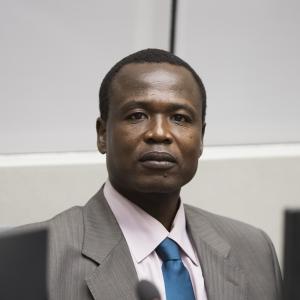On February 4, 2021, the International Criminal Court (ICC) convicted former Lord’s Resistance Army (LRA) commander Dominic Ongwen on 61 charges committed during the Ugandan civil war, including “murder, rape, sexual slavery, abduction, and torture.” He will spend the next 25 years in prison. From a legal perspective, Ongwen is undeniably guilty of horrific crimes. However, his case also elicits important yet uncomfortable questions about how we determine guilt outside the legal realm—particularly for those with upbringings as violent as their crimes. Ongwen’s complicated past requires us to differentiate between the markers of objective legal guilt and what constitutes moral and ethical culpability.
In his defense, Ongwen argued that his actions must be contextualized by the fact that he had been abducted and forced to join the LRA as a 10-year-old child soldier. It was for this reason that he pleaded not guilty, arguing that he was “one of the people against whom the LRA committed atrocities” and therefore a victim rather than solely a perpetrator of violence. He argued that any crime he had committed while in the LRA had been committed under duress because he was living in a state of profound fear. The ICC determined that Ongwen’s defense was insufficient, in part because of the time that had passed since he was abducted.
The nature of the case has prompted debates about how we should determine guilt and punishment in criminal defense. Ongwen was examined in court and found to have PTSD, major depressive disorder, and dissociative disorders, likely stemming from his childhood experiences. After the trial, the BBC published a piece that detailed not just his atrocious crimes but also the brutalities he had experienced since childhood. The article described how both of his parents had been killed in the civil war and how, after a failed escape attempt from the LRA, he was forced to skin one of his co-escapees alive. The piece concluded, “Two versions of Ongwen emerged during his trial: one of a brutal killer, the other of a traumatized child soldier who grew up to be a conflicted man.”
In her partial dissent during Ongwen’s appeal trial, Judge Luz Del Carmen Ibáñez Carranza clarified that she sought not to dispute Ongwen’s conviction but rather the long sentence imposed on him. She argued that Ongwen’s “experiences [as a child soldier] impacted on his personality, brain formation, future opportunities and the development of his moral values.” The dissenting opinion also quoted a series of amicus briefs authored by three professors, which argue that Ongwen’s upbringing influenced him such that he “should be considered a child soldier to this day.” The briefs further describe how children are often directly targeted in times of war because of their impressionability.
With this analysis in mind, Ongwen’s conviction hinges on a critical question: Where is the line between perpetrator and victim? How do we judge crimes committed by a person whose life and choices have been indelibly shaped by the violent structures of power that they were forced into? Moreover, does Ongwen’s conviction imply that “innocence” is reserved for the few child soldiers who can achieve freedom and thus avoid committing crimes? After all, it is out of the question to convict child soldiers who have broken free from their organizations—but opportunities to escape are rare and dangerous. Innocence is therefore only offered to those who can escape the systems of violence and coercion they have been brought into at a young age. Had he been successful in his escape attempt, Ongwen would have likely gone on to live a completely different life.
Ongwen’s story sheds light on the complicated nature of guilt as it exists outside of the legal system. His culpability relied on a pivotal moment in his life that he had no control over—the moment he was kidnapped as a child. This is not to say, necessarily, that Ongwen and others like him are entirely innocent but more so that determining their guilt is complicated by the conflicting elements of their identities. At what moment did Ongwen cease being a child soldier and start being fully responsible for his actions? More broadly, Ongwen’s case pushes us to reestablish our understanding of guilt as something that exists separate from legality. Guilt is an important concept to define because it determines who we allow to engage in our society—who is free and who is not. Therefore, understanding the limitations of legally defined guilt is critical before creating our own verdicts on people’s wrongdoings.
